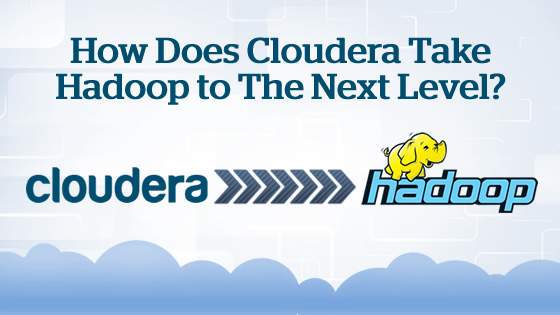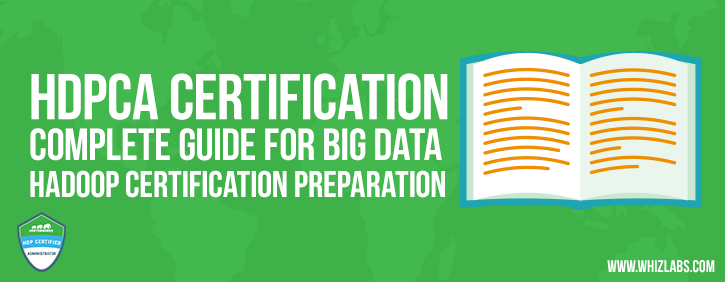Hadoop is the world’s first unified open source platform for big data and Cloudera is today an enterprise analytic big data management platform powered by Apache Hadoop™. Indeed Cloudera and Hadoop complement each other.
Cloudera and Hadoop together offer enterprises one single place for data management and data analysis. You can evaluate the data and invest based on it. Cloudera offers enterprises a complete data platform (CDH) along with open source Hadoop ecosystem. For this reason, today Cloudera is the World’s most trusted and used enterprise Hadoop data hub.
From enterprise application to education Cloudera takes Hadoop to the next level. In this blog, we will discuss on those core areas where Cloudera and Hadoop relate to each other.
Enroll Now: Hadoop Basics Online Training Course
CDH – The Most Trusted Hadoop Data Processing Platform
The significance of Cloudera and Hadoop starts with CDH. It is Cloudera’s popular distribution for Hadoop. Also, it is the most used Hadoop distribution in the market and reliable.
CDH provides users
- All the core elements of Hadoop
- Scalable storage and distributed computing
- Web-based user interface with necessary enterprise capabilities
- Helps in unified batch processing
- Interactive SQL with interactive search
- Role-based access controls
Cloudera Works on Hadoop Improvement Areas
Hadoop emerged as a robust big data platform. However, Hadoop inhibited its real power due to its immature tooling and infrastructure. There were some core focused areas of Hadoop which enterprise users have eyed on before adopting it in mainstream IT applications.
These are mainly –
- Data security
- Auditing
- Access control
- User notification system of job failures
- Software updates with required upgrades, and much more.
How does Cloudera Extend New Enterprise Standard for Hadoop?
Cloudera sets new enterprise standards for Hadoop. Its continuous developments in the Hadoop areas have delivered a rock-solid production-friendly enterprise integration solution for users. Hence, it helps to meet their requirement for high-end value from business data.
With its newly launched products, like Cloudera Navigator, Cloudera Enterprise 5, Cloudera Manager 4.5, and Sentry Cloudera it addresses all the improvement areas of Hadoop. Cloudera takes Hadoop towards maturation and completeness for business use. Moreover, as a big data platform, it helps in meeting the compliance with centralized data management.
Cloudera Enterprise 5 Turns Hadoop to the NextGen Big Data Platform
The Enterprise Data Hub is the need of the hour. As a result, they need to store and handle all data on their existing architecture. Enterprise Data Hub enables –
- Flexible running of a variety of enterprise workloads. It may include batch processing, SQL queries, enterprise advanced analytics
- Integrating with existing systems
- Robust security
- Governance
- Data protection, and
- Data management
Cloudera bridges these gaps with its innovation in Cloudera Enterprise 5. It is a robust application to handle a wide range of business problems. Data volume is increasing massively every day. Consequently, Cloudera Enterprise 5 enables users to manage those workloads with optimized efficiency.
Cloudera Enterprise 5 bring Noticeable Changes in Hadoop for Data Processing
Cloudera and Hadoop work together to improve the data processing speed in following ways –
- In-Memory HDFS Caching: With Cloudera Enterprise 5, Hadoop will cache datasets from HDFS to in-memory. Hence, it makes a significant change in MapReduce data processing performance which is usually slow.
- Resource Management: Cloudera Enterprise 5 enables YARN (Yet Another Resource Negotiator) and Cloudera Manager to deliver advanced resource management through a single cluster. Using it, enterprises can now run multiple frameworks at a time for data processing and analysis.
Furthermore, it helps administrators to allocate resources by workload and workgroup. Hence, it ensures the best combination of resource performance and utilization.
- Manage and Explore Big Data. Cloudera Enterprise 5 enables centralized data auditing for Hadoop. Also, its Cloudera Navigator now provides management and exploration of data.
- Efficient Data Discovery: Cloudera and Hadoop enable data analysts and data modelers to search, explore, define and tag datasets. Hence, they can identify relevant information for downstream processing or analysis.
- Data Lineage: Cloudera Navigator is the industry’s first Hadoop data lineage solution. It enables customers to find associated datasets. Also, it helps to meet regulatory requirements for data for data governance and retention policies.
- Data Protection: Cloudera Enterprise 5 supports HDFS and HBase to snapshots data to prevent data loss.
[divider /]
Preparing for Cloudera Administrator certification exam? Here is the complete guide on How to prepare for Cloudera Certified Associate Administrator (CCA-131) Certification Exam.
[divider /]
Cloudera Sets Mission-critical Standards for Hadoop
Hadoop management tools have evolved over the time. Initially, it lacked the necessary integration and controlling capabilities. Hence, integrating into existing enterprise data infrastructures was an issue. However, the coexistence of Hadoop with its available resources provides truly comprehensive big data management.
These resources include –
- all existing systems
- platforms
- applications
- processes
Hence, customers faced issues regarding using data sets during mission-critical projects and gaining insight from it.
However, Cloudera and Hadoop are increasingly adopted as an integrated data repository to process the structured and unstructured data. Furthermore, it could be highly sensitive data which needs to maintain strict compliances.
Cloudera introduced its recent advancements to make Hadoop a complete big data platform. Cloudera offers data management features which follow data compliance and standard policy. This way Cloudera and Hadoop help in executing mission-critical applications.
Cloudera Manager 4.5 – An End to End Management Application
Cloudera Manager 4.5 delivers capabilities to design and simplify the end to end management of Hadoop. These key updates enable customers to:
- Performing platform upgradation
- Smooth visualization of key metrics using interactive charts
- Heterogeneous clusters management
- Better integration with existing enterprise IT management tools via SNMP
Cloudera Navigator a New Concept of Data Management Layer
Existing Hadoop-based systems faced a gap in visibility and data control. This is an integral part of any data management. Hence, to meet enterprise requirements, Cloudera introduced Cloudera Navigator for end-to-end data management in Hadoop clusters. It is complementary of Cloudera Manager with the key features of Cloudera.
It helps –
- To provide required administrative capabilities.
- To secure, explore and govern the vast amounts of a diverse set of data in Hadoop systems.
- To realize advantages of sensitive and highly secure big data sets.
- Auditing capabilities for administrators so that they can index and store a full log of data access from HDFS, Hive, and HBase.
- It addresses the data security issues related to the financial transaction services, government, healthcare, and other sectors.
[divider /]
Also Read: Is CCA Administrator Certification Worth Investment?
[divider /]
Is Your Work Safe?
The most popular objective of Hadoop is its ability to store data. It can store date at a much lower price than the logical database management software. Hence, it helps companies to use all their data to make better decisions.
However, Hadoop’s’ file system security level is not strong. Furthermore, it lacks the right support to guarantee secure data accessed by users and applications. Now this problem forces enterprises to stress upon security in different industries.
Not to mention, security is an essential need (like government, financial services, and healthcare).Either you can prevent users entirely or let data unprotected. Mostly, the best choice is the first, and this is inhibiting Hadoop of data access.
Sentry – Cloudera’s New Initiative for Security of Hadoop Data
Cloudera did not stop in improving Hadoop’s data security and launched Sentry. It is a new open source authorization technology that addresses these concerns. Sentry provides role-based authorization. It is required to provide specific levels of access to the right users and for the right applications. Along with the role-based approval, it supports a multi-tenant administration which allows Hadoop operators to:
- Store more data
- Give end-users access to that data
- Create new use cases
- Enable applications of multi-user
Based on the above, we intend to percolate Sentry to maximize its usefulness across the Hadoop ecosystem.
Leveraging Knowledge for Hadoop Professionals
Cloudera’s contribution to continuous upgradation does not stop with its innovation and products. Technology is for mankind and not to mention by people. Hence, building an active Hadoop community is the only way to the real success of Hadoop in the global market.
Thus Cloudera offers different Cloudera Hadoop certification platforms. These certifications help to build exceptional Hadoop professionals in the market.
The certifications cover the following professional fields of Hadoop.
- Cloudera Certified Professional (CCP) for Data Engineers
- Cloudera Certified Associates (CCA) which covers necessary skill sets
- For Hadoop and Spark developer CCA Spark and Hadoop Developer
- Hadoop Data analyst CCA Data Analyst
- Hadoop Administrator CCA Administrator
The Format of Exams
Each question is scenario based, and you need to solve them using some tools like Hive or Impala. Sometimes you need to code as well. So, they will provide you with a template that contains a skeleton of the solution. Hence, you can fill in the missing lines with your code. This template is written in Python or Scala programming language. But you can choose to solve the scenario using preferred programming language.
Similarly, for administrator exam, they test for administrative skill in Hadoop cluster with given set of configuration related scenarios.
You can check Cloudera’s website to get the more details on the certification.
How does Cloudera Certification Add Value to Your Profile?
Not to mention, Cloudera certification exams are among the most difficult technical certification to pursue considering its complexity and cost.
Furthermore, evaluation and your score immediately appear after finishing via e-mail on the same day. And if you pass they will send you pdf (certification of the pass, License number, and link to download CCA Logos for your personal and business use).
Cloudera certification assures you as an efficient Hadoop professional. Along with your knowledge level, it will help you to get a hefty package in the industry.
Bottom Line
To conclude if you want to grow as a Cloudera certified Hadoop professional you need to invest a considerable amount of time and money for the exam. Without proper training, it is difficult to crack such a tough exam.
Whizlabs has launched CCA 131 certification training guide which will meticulously help you to achieve the next level in your preparation with its hands on and well-versed materials. If you want to know more about our guide and the certification, please go to our previous blog on CCA 131 certification.
- Top 45 Fresher Java Interview Questions - March 9, 2023
- 25 Free Practice Questions – GCP Certified Professional Cloud Architect - December 3, 2021
- 30 Free Questions – Google Cloud Certified Digital Leader Certification Exam - November 24, 2021
- 4 Types of Google Cloud Support Options for You - November 23, 2021
- APACHE STORM (2.2.0) – A Complete Guide - November 22, 2021
- Data Mining Vs Big Data – Find out the Best Differences - November 18, 2021
- Understanding MapReduce in Hadoop – Know how to get started - November 15, 2021
- What is Data Visualization? - October 22, 2021


